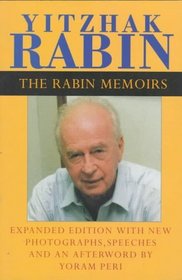Search -
The Rabin Memoirs
The Rabin Memoirs
Author:
The assassination of Yitzhak Rabin in November of 1995one year after he shared the Nobel Peace Prize with Yasir Arafatsent shock waves around the world. Known as both a man of war and of peace, the Jerusalem-born Israeli prime minister played a key role in developing the Jewish state and was instrumental in establishing peace in the Middl... more »
Author:
The assassination of Yitzhak Rabin in November of 1995one year after he shared the Nobel Peace Prize with Yasir Arafatsent shock waves around the world. Known as both a man of war and of peace, the Jerusalem-born Israeli prime minister played a key role in developing the Jewish state and was instrumental in establishing peace in the Middl... more »
ISBN-13: 9780520207660
ISBN-10: 0520207661
Publication Date: 11/17/1996
Pages: 468
Rating: ?
ISBN-10: 0520207661
Publication Date: 11/17/1996
Pages: 468
Rating: ?
0 stars, based on 0 rating
Publisher: University of California Press
Book Type: Paperback
Other Versions: Hardcover
Members Wishing: 2
Reviews: Amazon | Write a Review
Book Type: Paperback
Other Versions: Hardcover
Members Wishing: 2
Reviews: Amazon | Write a Review
Genres:




